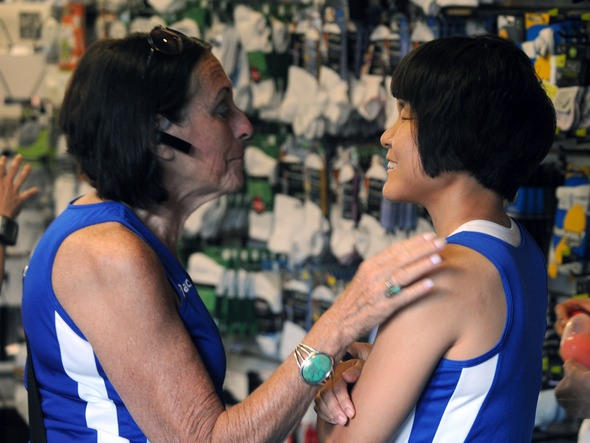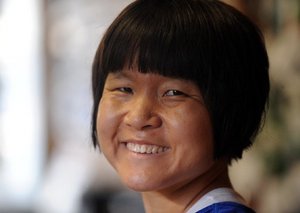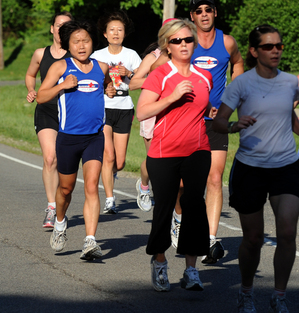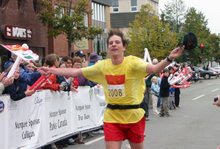Milan woman overcomes health obstacles on road
to running success
By: Pamela Gossiaux
Freelance reporter 
Adair Renning, left, gives her daughter Asia words of encouragement at Running Fit Saturday morning before Asia headed out for a training run. Lon Horwedel | AnnArbor.com
Asia Renning has hardly missed a day of running in 11 years.
The 28-year-old Milan woman is running in her 100th race since high school on Sunday, when she’ll participate in the Dexter-Ann Arbor Run, a half-marathon. In 1996, she served as Olympic torchbearer when she carried the torch through Detroit.
Her achievements are even more remarkable considering the many health hurdles she has overcome since being adopted by Adair and Jerry Renning.
As a baby, Renning was in a Korean orphanage and due to her many medical problems was deemed unsuitable for adoption. The Rennings thought otherwise.
Adair Renning, Asia's adopted mother, was thumbing through an adoption magazine. She and husband Jerry Renning had already adopted Meghann from Korea, and they knew some day they would adopt another baby.

Asia Renning, who was adopted at age 2, will run her 100th race Sunday in the Dexter-Ann Arbor Run half-marathon. Lon Horwedel|AnnArbor.com
"There were some photos of kids they were seeking sponsors for, to pay for medical costs," says Adair Renning, who has written a book about Asia’s struggles. "I saw Asia's picture. I always knew we wanted another child - and I always knew I would know her when I saw her."
The Rennings looked into adopting her. They were told the baby needed surgery to reverse the colostomy (surgical formation of an artificial anus by connecting the colon to an opening in the abdominal wall) that was created when she was 13 days old and that she demonstrated autistic tendencies.
"Initially we were looking at a lot of things through rose-colored glasses," says Adair Renning. "We had a belief that there was nothing that love couldn't fix, and that all she needed was a family to love her and care for her and a consistent caregiver. We also believed she needed to get the colostomy reversed in order to continue developing the way a 2-year-old should."
When Asia arrived, the Rennings found out "things that we did not know ahead of time," says Adair Renning.
Asia was 2 years old and had no muscle control. She couldn't sit up, roll over, crawl, or hold things in her hands. She didn't even didn't know how to bite or chew food because she had only been bottle-fed.
The orphanage also felt she would be unable to bond with any family.
It took nearly six more years before Asia was diagnosed with autism. She had more surgery to fix her colostomy, and was put on a special diet for her food allergies. The family had finally found therapies that worked.
They wanted to get Asia involved in sports and talked to her middle school track coach.
"I give a lot of credit to Asia's first running coach, Steve Porter, of Milan High School. If he hadn't been willing to take on the challenge of having a child with autism on his team, and hadn't instilled a compassion and awareness in the other members of the team, we may not have been having this conversation for this story. Coach Porter worked with Asia for five years ... one in middle school and all four years of high school."
After high school, Asia kept running.

Asia Renning, 29, far left in blue, runs with fellow runners Saturday morning. Lon Horwedel | AnnArbor.com
"She has hardly missed a day of running in 11 years," says Adair Renning.
In 2006 Asia started training with the Running Fit 501 team with Kathleen Gina, who is the coach.
She was paired up with Katie Sytniak as her running partner, and the two spent a year training together for the 2009 Detroit marathon.
"We both learned a lot about each other," says Sytniak. "When I became her running partner I thought I was going to be in the teaching role, that I was going to help her, but I figured out pretty quickly that we were both helping each other. Some days I wasn't motivated, but she would push me and encourage me to run faster, and other days I would push her."
They finished the marathon, and still get together regularly to run or have dinner.
"Something else that Asia really gives to people is love," says Syntiak. "It's really simple but she has a way that makes you feel appreciated and special. She'll just say something, like 'I like you, Katie.’ A lot of times you don't say that to your friends, it's a given. But she says it, and you think 'Oh, thanks, I like you too.' She has a lot of gifts that you don't realize you are looking for. It's an unexpected gift and it feels really good."
Asia's love for people and socializing is uncommon in someone with autism.
When she's not running, she works for CHS in Ann Arbor, an employment agency for people with disabilities. She is also a member of the Best Buddies , a group of college-age students paired with young adults with special needs. The purpose is socialization and friendship.
"We are pretty proud of her, not just her achievements but also because her story is something positive for parents and other children with autism," says Adair Renning. "So many times when parents are given a diagnosis of autism for their child they are not given a lot of hope. When they can look at someone like Asia who has accomplished so much it gives them hope for their child."
Adair Renning is an inspiration, too, said Sytniak.
"The book that she wrote that details their whole family's story is super inspirational. I feel like they have been so supportive to give Asia the very best.
"It's cool how they don't see barricades, where most people would see those barricades. They problem solve and figure out how they can make it work for Asia, and it's really cool that they are able to do that. A lot of people would see the wall and Adair and Jerry don't see the wall."
To learn more about Asia's story, go to http://www.koreanbeacon.com/?s=asia+renning
 It was sunny and 21 degrees.
It was sunny and 21 degrees.































































